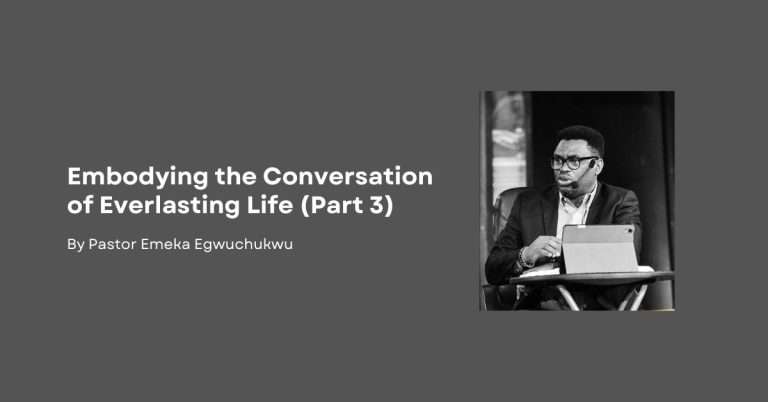The Declaration of The Father’s Name and The Manifestation of His Love

Event: Season of the Spirit (Day 3)
Theme: The Name and the Love of the Father
Date: Sunday, 4th May 2025
Speaker: Pastor Tosin Gabriel
“Be strong and of a good courage: for unto this people shalt thou divide for an inheritance the land, which I sware unto their fathers to give them.” (Joshua 1:6). The land is God. Just like a land can be divided as an inheritance, God also can be “divided” because He is our inheritance. We inherit God as children of God; as joint-heirs with Christ (Romans 8:16-17). To inherit God, He has to be divided and given to us in portions until we are full of Him.
The name and love of the Father cannot be taught without divine assistance because only Jesus knows the Father. “All things are delivered unto me of my Father: and no man knoweth the Son, but the Father; neither knoweth any man the Father, save the Son, and he to whomsoever the Son will reveal him.” (Matthew 11:27). To know the Father is to know who He represents and what He has.
The name of the Father is the nature of the Father. Name characterizes nature, identity and authority. The Father’s name is His nature, identity and authority. We cannot know the name of the Father without the love of the Father being manifested. The name of the Father is hidden in Himself. We cannot have access to His name without His love being manifested.
God can relate with us as “God” and as “Father”. God is the God of all flesh (Jeremiah 32:27), but His fatherly nature is hidden because it is attached to inheritance. God as a person remains undefined until His love is manifested. To know the name of the Father, we must know the love of the Father first. For instance, kindness is a manifestation of God’s love.
Love is the manifestation and the communication of the Father’s name and nature. The love of the Father is different and unique. God has a generic love for every man but the Father’s love differs from this generic love. The manifestation of the love of the Father to a man is a calling to come and know His nature. The Father will not commend His love towards a man who will not receive His nature. It is possible for God to give man everything including the earth but not Himself. Sometimes, we define the love of God carnally, that is, through natural possessions but the actual love of God to us is the giving of Himself.
It is not all men that can receive the love of Father. “He that hath my commandments, and keepeth them, he it is that loveth me: and he that loveth me shall be loved of my Father, and I will love him, and will manifest myself to him.” (John 14:21). This verse implies that if a man does not love Jesus Christ, he will not be loved of the Father. The love of the Father is attached to the ministry of the Father which rides on His love and aims to raise a people who will have His name.
The essence of knowing the Father’s name and love is for us to be partakers of the Father’s nature (2 Peter 1:4). This is the burden for this season – that we bear the name of the Father. We cannot sit on the throne without having the name of the Father.
The Father’s name has two levels – the everlasting name and the eternal name. The love of the Father equally has two levels – everlasting love and eternal love. The levels of the Father’s name demonstrate the true God (everlasting God) and the only true God (eternal God). The true God is the key to the only true God (John 17:3). A believer cannot partake of any of the names of the Father without the manifestation of the love of that realm.
When the Father manifests a portion of His love and it is understood, such a person has understood a manner of His love (1 John 3:1). When we walk in the manner of the love being manifested, we will acquire the name or the nature behind that manner of love.
The first man to experience the Father’s name and love is our Lord Jesus Christ. The love God apportioned for man differs from His love towards other creatures including angels (Hebrews 2:6). This is evident in the fact that angels cannot partake of the nature of the Father. Since the fall of man, God was restrained from manifesting His love as a father until Jesus came to earth as a man.
“For the Father loveth the Son, and sheweth him all things that himself doeth: and he will shew him greater works than these, that ye may marvel.” (John 5:20). “All things” here are things of the Father’s nature. The manifestation of the Father’s love is to show us all things which are the things of inheritance. “[1] God, who at sundry times and in divers manners spake in time past unto the fathers by the prophets, [2] Hath in these last days spoken unto us by his Son, whom he hath appointed heir of all things, by whom also he made the worlds.” (Hebrews 1:1-2). To be an heir of all things is to inherit all things that make up the Father’s name.
Our earnest desire in this season should be for the Father to manifest His love towards us so that we can partake of His nature. We need the Son to know and understand the name and the love of the Father. “All things are delivered unto me of my Father: and no man knoweth the Son, but the Father; neither knoweth any man the Father, save the Son, and he to whomsoever the Son will reveal him.” (Matthew 11:27). “All things” here are not things of the present but things of the world to come. The world to come is the world of God’s name. The Son will not reveal the Father until we have obeyed the first level of commandment which are the things brought by the Holy Spirit (John 16:13).
The Holy Spirit was given to prepare us for the love of the Father. The essence of the Holy Spirit is to move us into Christ; to move us from being carnal to having the Christ nature in our soul. “My little children, of whom I travail in birth again until Christ be formed in you.” (Galatians 4:19). At new birth, the Holy Spirit unites with our spirits and can only enter our souls when Christ has been formed in our souls. He ministers to our souls from our spirits; raising us from milk to meat.
It is the greatest breakthrough for the Holy Spirit to move from our spirits and stay in our souls. Thus, we should not limit the Holy Spirit to staying in our spirits, otherwise, He will be unable to prepare us for the love of the Father.
“[13] In whom ye also trusted, after that ye heard the word of truth, the gospel of your salvation: in whom also after that ye believed, ye were sealed with that holy Spirit of promise, [14] Which is the earnest of our inheritance until the redemption of the purchased possession, unto the praise of his glory.” (Ephesians 1:13-14). We must understand that the love of the Father towards man is a peculiar love and not the generic love of God towards all men. The love of the Father was carved from the person of God for our inheritance. In the season of the Father’s love, it is foolish to compare ourselves with others or envy them because of their natural progress.
“[12] I have yet many things to say unto you, but ye cannot bear them now. [13] Howbeit when he, the Spirit of truth, is come, he will guide you into all truth: for he shall not speak of himself; but whatsoever he shall hear, that shall he speak: and he will shew you things to come; [14] He shall glorify me: for he shall receive of mine, and shall shew it unto you; [15] All things that the Father hath are mine: therefore said I, that he shall take of mine, and shall shew it unto you.” (John 16:12-15). “Many things” and “all things” are the things of the Father. “Things to come” begin with Christ who is a man of the world to come and of the present. Christ is the new man; a man with new things (2 Corinthians 5:17). The Holy Spirit shows the new things from our spirits so that our souls can put on the new man. He ministers to us portions of Christ (John 16:15).
The Father will not show His love by Himself; His love will be shown by the Son who will reveal the Father to us. “He that hath my commandments, and keepeth them, he it is that loveth me: and he that loveth me shall be loved of my Father, and I will love him, and will manifest myself to him.” (John 14:21). The “commandments” here are the things of Jesus Christ shown to us by the Holy Spirit (John 16:14).
The sole duty of the Holy Spirit is to show the things of Jesus, which are the commandments of Christ, just as it is the Son’s duty to show the things of the Father. “Whom having not seen, ye love; in whom, though now ye see him not, yet believing, ye rejoice with joy unspeakable and full of glory.” (1 Peter 1:8). “Glory” here is the glory of Christ.
Much more than professing our love for Christ with our lips, to truly love Christ is to keep His commandments (John 14:21). Love is by manifestation, hence, there is no manifestation outside of love. “Wherefore come out from among them, and be ye separate, saith the Lord, and touch not the unclean thing; and I will receive you.” (2 Corinthians 6:17). To manifest is to reveal commandments. “Among them” refers to men of the present.
“For the grace of God that bringeth salvation hath appeared to all men, [12] Teaching us that, denying ungodliness and worldly lusts, we should live soberly, righteously, and godly, in this present world.” (Titus 2:11-12). The “grace of God” here is a person bringing salvation. The commandments of Christ are faith, hope and charity (1 Corinthians 13:13) which represents living soberly, righteously and godly, respectively. By the formation of Christ in us, we take on the new man and as a result, we are no longer of this present world.
For us to receive the ministration of the Father’s name, we must come out from among them; from this present world and be separate (2 Corinthians 6:17). This is not the new birth call because at the new birth, the soul state of a new believer soul will be of this present world. We must be ready to detach ourselves from our identities or titles in this present world including our tribes or education status.
For example, it should not be a problem for an Hausa person to marry an Igbo person or for a Master degree holder to marry an uneducated person. If we cannot disassociate from our natural status, we are measuring ourselves by the present world and cannot receive the love of the Father.
The installations of the devil in the souls of men are many. It is evil before the Father to want to be disassociated from a brother because of a natural status. The Father does not want us to idolize anything. If we want to lay hold on the Father’s love, we must lay aside idols in our hearts. If we put our hope in the present, the love of the Father is not in us. The first manifestation of the Father’s love lies in being judged to the extent that we have come out from among them (2 Corinthians 6:17).
When the Father’s love is being manifested through the Son, there will be demands of the Son. The Son will not show the Father’s love to spiritual babies as His demands are high in the season of the Father’s love. Our separation from the present is not to live by its standards or values. Staying in the present will prevent us from laying hold of Christ in preparation for the Father’s love.
As parents, we must be mindful of not tying our children to this present world. Our children must and should love the things of the world to come; the things of Christ, the Father and of God. The knowledge of scriptures should not evade them. We should train them like Abraham trained his household (Genesis 18:19). Parents should not discourage their children from spending time to hear and do God’s word over ambitions in things of this present world.
“Wherefore come out from among them, and be ye separate, saith the Lord, and touch not the unclean thing; and I will receive you,” (2 Corinthians 6:17). The “unclean thing” is this present world. We are to use the world but not abuse it (1 Corinthians 7:31). This means we should not have confidence in it, partner with it or adopt the natures it communicates (2 Corinthians 6:17-18).
It is this present world that fosters flesh in us. Natures like envy are generated from this present world. We envy and compete for things that are perishable and of this present world. A better competition is to want to outdo one another in natures of the world to come like patience. This is the real competition.
“Father, I will that they also, whom thou hast given me, be with me where I am; that they may behold my glory, which thou hast given me: for thou lovedst me before the foundation of the world; [25] O righteous Father, the world hath not known thee: but I have known thee, and these have known that thou hast sent me; [26] And I have declared unto them thy name, and will declare it: that the love wherewith thou hast loved me may be in them, and I in them.” (John 17:24-26). Eternal love existed before the foundation of the world and qualifies us for the eternal nature of God. The declaration of the Father’s name is in two folds and is evident in John 17:26. After the Holy Spirit has prepared us, the Son will install the love of the Father in us.
“And will be a Father unto you, and ye shall be my sons and daughters, saith the Lord Almighty” (2 Corinthians 6:18). The “Lord Almighty” here is our Lord Jesus Christ (Revelation 1:8) who will manifest Himself to us on behalf of the Father. As Jesus Christ manifests Himself, He will begin to declare the name of the Father (Hebrews 2:11-12).
The everlasting name of the Father is in two folds: the living God and the true God. All of the Father’s love can be received at once as every manifestation of His love has its demands. Jesus, while on earth, declared the name of the living God but not the true God (Matthew 16:16). The name of the true God was not declared until 1 John 5:20 but Jesus left the early church with the declaration of the living God which they prospered in (1 Timothy 3:15; Hebrews 3:12) and is the border of the Father’s love.
The early church sustained the allocation of the living God until the declarations of Apostle John in 1 John. And we know that the Son of God is come, and hath given us an understanding, that we may know him that is true, and we are in him that is true, even in his Son Jesus Christ. This is the true God, and eternal life.” (1 John 5:20). At this stage, the early church had the full knowledge of the everlasting God.
It will be difficult for sons to separate themselves from the present world, in preparation for the Father’s love, because it is a glory (2 Corinthians 6:17-18). “He that hath my commandments, and keepeth them, he it is that loveth me: and he that loveth me shall be loved of my Father, and I will love him, and will manifest myself to him; [22] Judas saith unto him, not Iscariot, Lord, how is it that thou wilt manifest thyself unto us, and not unto the world? [23] Jesus answered and said unto him, If a man love me, he will keep my words: and my Father will love him, and we will come unto him, and make our abode with him.” (John 14:21-23). John 14:21 marks the beginning of knowing the Father’s love while John 14:23 portrays continuation in the Father’s love.
When the Father has been manifested, more commandments will be given to us for keeping and to be observed by the Father (John 14:24). There is the first love and the last love of the Father (John 14:21; 23). Behind every love is a work. The works of love lead one to the name attached to that love.
The first works in Revelation 2:4-5 is the first manifestation of the Father’s love in everlasting life, which had been shown to the Ephesian church, but it was observed by the Father that they had drawn back. It is therefore possible to hear the Son of God and still draw back (Hebrews 3:15).
Our attachment to the vain glory of this present world hinders us from appreciating the commandments of the Father. The giving of the first love of the Father is insufficient, hence, the last works must also be completed. The last works are the last manifestation of the Father’s love in everlasting life, after which the Father can tabernacle in us.
“And I looked, and, lo, a Lamb stood on the mount Sion, and with him an hundred forty and four thousand, having his Father’s name written in their foreheads” (Revelation 14:1). The Father’s name can be written on people! It is possible to have the Father’s name written on our foreheads. While the Father’s love may be waiting on us to be prepared, we should hasten our formation.
We must obey at all levels to get to the last manifestation of the Father’s love, for we will not get to it if we try to bypass any level. As such, we must fulfil all our pending charity commandments to inherit the Father’s name.
(Pastor Emeka Egwuchukwu rounding off…)
The love of the Father has demands. It is not by feelings, rather, it requires high commandments to be kept. The unclean thing will hinder us from keeping these commandments; from inheriting the name of the Father (2 Corinthians 6:17). The Father’s love has its manners which are for those who will receive His nature (1 John 3:1-2).
Message Ends






